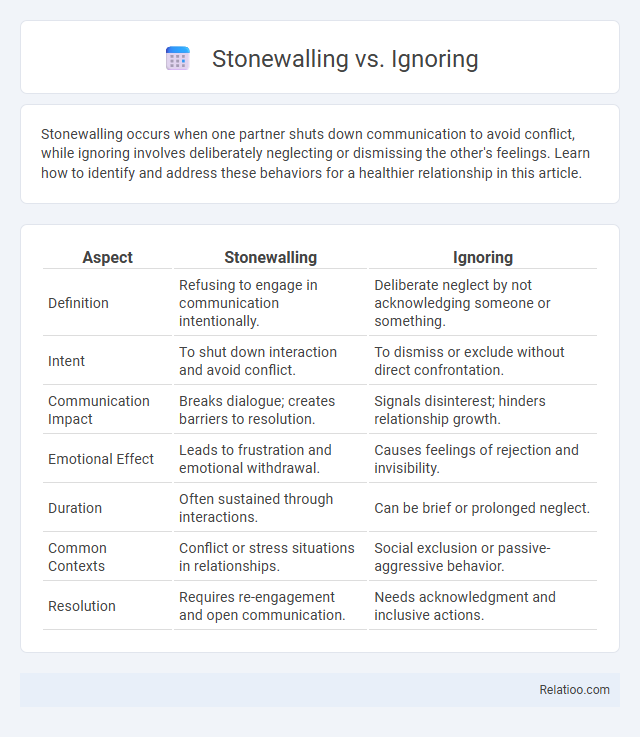Stonewalling occurs when one partner shuts down communication to avoid conflict, while ignoring involves deliberately neglecting or dismissing the other's feelings. Learn how to identify and address these behaviors for a healthier relationship in this article.
Table of Comparison
| Aspect | Stonewalling | Ignoring |
|---|---|---|
| Definition | Refusing to engage in communication intentionally. | Deliberate neglect by not acknowledging someone or something. |
| Intent | To shut down interaction and avoid conflict. | To dismiss or exclude without direct confrontation. |
| Communication Impact | Breaks dialogue; creates barriers to resolution. | Signals disinterest; hinders relationship growth. |
| Emotional Effect | Leads to frustration and emotional withdrawal. | Causes feelings of rejection and invisibility. |
| Duration | Often sustained through interactions. | Can be brief or prolonged neglect. |
| Common Contexts | Conflict or stress situations in relationships. | Social exclusion or passive-aggressive behavior. |
| Resolution | Requires re-engagement and open communication. | Needs acknowledgment and inclusive actions. |
Understanding Stonewalling and Ignoring
Stonewalling involves emotionally shutting down and refusing to engage in communication, often as a defense mechanism during conflicts, leading to a breakdown in dialogue. Ignoring, on the other hand, is consciously choosing to disregard or avoid addressing a person or issue, which can create feelings of neglect and resentment. Understanding these behaviors helps identify their impact on relationship dynamics and highlights the importance of effective communication for conflict resolution.
Key Differences Between Stonewalling and Ignoring
Stonewalling involves actively refusing to communicate, often with silence or minimal responses, creating emotional distance, while ignoring is a passive behavior where someone deliberately pays no attention or dismisses the other person without engagement. Stonewalling typically causes frustration due to its confrontational nature, whereas ignoring can lead to feelings of neglect and invisibility. Understanding these key differences helps you identify communication barriers and address relationship conflicts more effectively.
Psychological Impact of Stonewalling
Stonewalling, unlike ignoring, involves a deliberate refusal to communicate, often leading to increased emotional distress and feelings of rejection in relationships. The psychological impact of stonewalling includes heightened anxiety, decreased relationship satisfaction, and impaired conflict resolution due to the perceived emotional withdrawal. While ignoring may be passive, stonewalling actively blocks communication, causing deeper emotional harm and long-term trust issues.
Emotional Effects of Being Ignored
Being ignored in any relationship can trigger feelings of rejection, loneliness, and diminished self-worth, significantly impacting your emotional well-being. Stonewalling, characterized by complete emotional withdrawal and refusal to communicate, intensifies frustration and fosters emotional distance. The emotional effects of being ignored often lead to increased anxiety, depression, and a breakdown in trust between partners or friends.
Common Causes of Stonewalling in Relationships
Stonewalling in relationships commonly stems from emotional overwhelm, fear of confrontation, or a desire to avoid conflict escalation, leading one partner to withdraw and shut down communication. Ignoring differs as it often reflects passive disengagement or deliberate neglect rather than incapacity to engage, whereas stonewalling actively blocks dialogue as a coping mechanism. Understanding these distinctions highlights how unresolved stress and poor emotional regulation contribute to stonewalling's destructive impact on relationship dynamics.
Why Ignoring Happens: Underlying Reasons
Ignoring often occurs due to emotional overwhelm, fear of confrontation, or a desire to protect oneself from further harm. Your mind may shut down communication temporarily as a defense mechanism when feeling vulnerable or threatened. Understanding these underlying reasons helps address the root cause of ignoring behavior in relationships.
Signs You’re Experiencing Stonewalling
Stonewalling manifests through consistent refusal to engage in communication, characterized by silent treatment, avoiding eye contact, or walking away during conflicts. Key signs include emotional detachment, a noticeable withdrawal from discussions, and an unyielding stance that blocks problem resolution. Unlike ignoring, which may be temporary or unintentional, stonewalling is a deliberate act to shut down dialogue and create emotional distance.
How to Recognize When You’re Being Ignored
Recognizing when you're being ignored involves noticing consistent lack of response, avoidance of eye contact, and minimal engagement during conversations. Stonewalling, characterized by complete withdrawal and silence, differs from ignoring, which may include subtle dismissive behaviors or selective attention. Pay attention to patterns of communication to distinguish genuine disinterest from stonewalling tactics, helping you address the issue effectively.
Effective Strategies for Response and Healing
Effective strategies for responding to stonewalling, ignoring, and ghosting involve establishing clear communication boundaries and fostering emotional safety to rebuild trust. Engaging in open dialogue with empathy, seeking professional counseling like cognitive-behavioral therapy (CBT), and practicing mindfulness techniques accelerate healing and prevent further emotional harm. Prioritizing self-care and setting consistent expectations helps individuals regain control and promotes healthier relationship dynamics.
Building Healthy Communication to Prevent Conflict
Stonewalling involves shutting down communication and refusing to engage, while ignoring means deliberately avoiding or dismissing someone's concerns; both behaviors harm healthy communication and escalate conflicts. Recognizing these patterns is crucial for building trust and fostering open dialogue, as your active listening and empathy can prevent misunderstandings. Establishing clear, respectful communication habits empowers you to address issues constructively and maintain strong relationships.

Infographic: Stonewalling vs Ignoring
 relatioo.com
relatioo.com